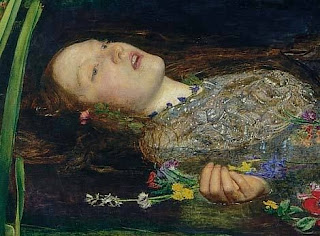The Yet Unknowing World by Fiona J. Mackintosh
From the bending willow’s grasp, she slides into the river. Eyes to the
sky, she floats downstream, opens her mouth and sings.
Good morrow, ’tis Saint Valentine’s day, All in the morning betime, And I a maid at your window, To be your Valentine.
Borne by her skirt’s twin billows, she sings of the fickleness of Princes, of he who called her celestial, his soul’s idol, sending her letters drenched with longing, “Doubt thou the stars are fire, Doubt that the sun doth move, Doubt truth to be a liar, but never doubt I love.”
Words that gave him leave to slide his arm around her waist, to kiss her neck under the heavy hair that floats around her now, mossy with crow-flowers and dead men’s fingers. But all too soon love turned to ashes in his mouth, and he called her bawd and wanton, as a riddling madness drove his mind to fever and his hand too quick to the sword. One thrust, and her father’s blood, a waxen pool of scarlet, seeped up the arras like a blush.
And he is dead and gone, laydee, he is dead and gone, At his head the grass-green turf, At his heels a stone.
As a bird in sleep, her sodden garments fold around her, the sweet green blur bruising to gentle black, and she’s weightless, stoppered, drifting and easeful as a babe in the womb. Yet as she sinks, she’s torn up through the river’s skin, and the air’s a blade in her chest. Bones laid out on the chill, hard ground, she’s gripped by a violent shivering.
“Sweet maid, you live.”
Her eyes open. Women chafe her feet, wring
water from her hair. Above her kneels the Queen, her face a woeful moon.
“Oh
Ophelia, you were to be my Hamlet’s bride – I would not let you drown.”
There’s not air enough to speak, river ooze still lodged in the clefts of her lungs.
“I’ll have my women bear you to the nuns. They’ll nurse you back to your wits and, when you’re well, they’ll put you on a ship to England.”
There’s not air enough to speak, river ooze still lodged in the clefts of her lungs.
“I’ll have my women bear you to the nuns. They’ll nurse you back to your wits and, when you’re well, they’ll put you on a ship to England.”
England. Pennants snapping
from great stone castles, hairy-legged horses pawing the peaty ground.
“I pray you, when you reach those foreign shores, tell the world of everything you’ve seen these days, every carnal act and casual slaughter, even those that were my own. The sands are running out for me, but you, Ophelia, can live to write the sorry tale. I beg you for the sake of him we love.”
The Queen bends close to hear her answer. Voiceless yet, Ophelia unfurls a trembling finger to a point and in the pliant river mud she writes “I Will.”




Comments
Post a Comment